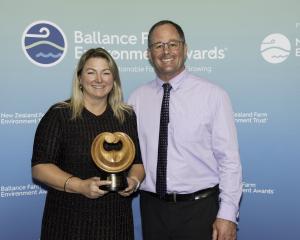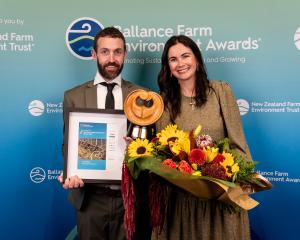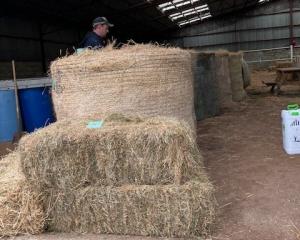
Mr Nelson, of Nelson Farming Company, was named the top regional prize-winner at the ceremony in Invercargill.
Since buying the 164ha property in 2003, the farm had moved from being a 50:50 sheep and deer operation to exclusively farming deer. The Nelsons now run 250 mixed-age stags, 400 breeding hinds, 180 R2 velvet stags and 180 R2 hinds, where were sold in-calf.
The judges noted that superior stockmanship and a well-optimised system enabled the team to successfully manage the high stocking rate. Stock classes were well prioritised and managed to ensure strong animal performance while maintaining high environmental standards.
Continuous improvement was a guiding principle at Nelson Farming Company, and the team recognised there was always something to refine and enhance.
Mr Nelson’s proactive approach to benchmarking and implementing expert advice drove ongoing development and adaptability in a constantly evolving industry.
The judges commended the strong inter-generational thinking and support, noting the clear alignment between strategic planning and consistently high on-farm performance.
A robust genetic programme focused on selecting desirable traits, such as high velvet production and disease resistance, and all hinds were DNA-tested to guide breeding decisions. That strategic approach to genetic selection had resulted in an annual velvet yield of 3400kg.
Winter grazing practices had been dramatically improved through the development of a wintering shed and construction of a dedicated winter hind pad. The infrastructure has both minimised pasture damage and improved animal welfare.
The judges highlighted Mr Nelson’s exceptional attention to detail in enhancing biodiversity, noting his commitment to native ecosystems through initiatives such as native plantings, pond creation and the replacement of eucalyptus with native species. His proactive approach to soil and water conservation was evident in the use of sediment traps and water flow management on relatively flat land, while substantial investment in shelter and shade further supported biodiversity across the farm.
In awarding the regional supreme award, the judges observed that the Nelson Farming Company exemplified what could be achieved with a strong business plan, clear strategic focus, superior livestock performance and strong environmental values.
"Their commitment to biodiversity is evident through well-considered native plantings that are thoughtfully integrated into their farming system, and their livestock management reflects in-depth planning, particularly around stock movement and wintering, to ensure a very high level of animal welfare."
Mr Nelson also won the following awards:
• Beef + Lamb New Zealand Livestock Farm Award.
• Rabobank Agri-Business Management Award.
• New Zealand Farm Environment Trust (NZFET) Biodiversity Award.
Other Southland Ballance Farm Environment Award winners include:
Jody and Blair Drysdale, of Hopefield in Northern Southland.
• Ballance Agri-Nutrients Soil and Nutrient Management Award.
• Hill Labs Agri-Science Award.
• Environment Southland Water Quality and Biodiversity Award.
Clarke and Megan Horrell, of Huntly Farm in Waikaia.
• Bayleys People in Primary Sector Award.
• Norwood Farming Efficiency Award.
The awards also recognised the Makarewa Headwaters Catchment Group as part of the Catchment Group Showcase, highlighting their collaborative efforts to support sustainable farming and environmental stewardship. The group helps farmers implement sustainable practices, improve water quality and meet environmental regulations. Their ultimate goal was to protect and enhance the Makarewa River and its tributaries through a community-led approach. With representatives from eight farms and more than 90% community involvement, their flagship Revival Project, launched in 2023, addresses the environmental damage caused by feral deer and pigs. Extensive research and awareness raising has led to the culling of more than 600 deer and numerous pigs. The group has also used advanced modelling to address nutrient and sediment runoff, and a community planting programme now includes native seed cultivation.
Mr Nelson joins the supreme winners from the 10 other regions in the awards in being considered for the Gordon Stephenson Trophy at the New Zealand Farm Environment Trust’s National Showcase in Wellington in June. — APL















